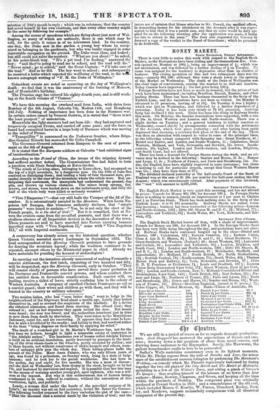t*trro.
We are still in a period of recess as far as regards dramatic productive- ness. ,Tack Sheppard has answered the expectations of friends and ene- mies; drawing down a fair quantum of abuse from moral censors, and drawing dense audiences to the Haymarket. Surely, like Mawworm, the gallant housebreaker ought to love to be persecuted. Sadkr's Wells maintains consistency even in its lightest moments. While Mr. Phelps reposes from the toils of Parolles and Lear, the minor stars of the establishment recreate Islington by performing The Merchant's Wedding,—a comedy which Mr. Planehe ingeniously fashioned by fusing together the two old plays of The City Match and The Match at Midnight, sprinkling in a few of the Widow's Tears, and adding a pinch of Green's Tu Quoque ; thus availing himself of the labours of no fewer than four authors—Maine, Rowley, Chapman, and Green, and keeping all the time within the precincts of Dodsley. The compound piece was originally produced at Covent Garden in 1828; and a remembrance of the old cast, which included Messrs. C. Bemble, W. Farren, Blanchard, .Keeley, Bart- ley, and Meadows, suggests melancholy comparisons with all theatrical companies of the present day.


























 Previous page
Previous page